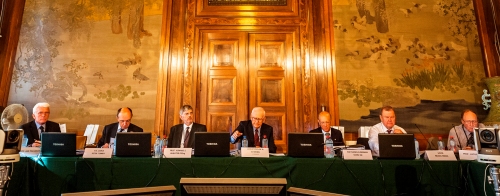A Tribunal constituted under the 1960 Indus Waters Treaty (also called the “Court of Arbitration” under the Treaty) today rendered its (partial) Award in a dispute between India and Pakistan over the construction of the Kishenganga hydro-electric power project by the former (previously covered here, here, and here). According to The Hindu, the Tribunal in its Award found that:
India can go ahead with the diversion of the waters of Kishanganga, a tributary of Jhelum, for hydro-electric power generation.
However, the court restrained India from adopting the drawdown flushing technique for clearing sedimentation in the run-of-the river project designed for generation of 330 MW power. India may have to adopt a different technique for flushing.
In the initial reports received by The Hindu it is learnt that the court also sought statistics on the environmental flows into the river downstream of the project.
To recall, Pakistan had originally requested the Tribunal to determine two issues:
1. Whether India’s proposed diversion of the river Kishenganga (Neelum) into another Tributary, i.e. the Bonar Madmati Nallah, being one central element of the Kishenganga Project, breaches India’s legal obligations owed to Pakistan under the Treaty, as interpreted and applied in accordance with international law, including India’s obligations under Article III(2) (let flow all the waters of the Western rivers and not permit any interference with those waters) and Article IV(6) (maintenance of natural channels)? [the “First Dispute”]
2. Whether under the Treaty, India may deplete or bring the reservoir level of a run-of-river Plant below Dead Storage Level (DSL) in any circumstances except in the case of an unforeseen emergency? [the “Second Dispute”]
From the above, it thus appears that the Tribunal found in favour of India on the issue of diversion (the “First Dispute”), but against it on the second issue of reservoir level (the “Second Dispute”).
As of writing this post, neither the Award nor a press-release was available on the Permanent Court of Arbitration website. As always, we hope that the Award will soon be made publicly available. ILCurry will bring you more detailed analyses as and when that happens.
UPDATE (19 Feb. 2013): The partial Award is now available on the PCA website here. A press-release is available here. According to the press-release:
In its Partial Award, which is final with respect to the matters decided therein, without appeal and binding on the Parties, the Court of Arbitration unanimously decided:
1. that the Kishenganga Hydro-Electric Project (KHEP) constitutes a Run-of-River Plant under the Treaty, and India may accordingly divert water from the Kishenganga/Neelum River for power generation by the KHEP in the manner envisaged. However, when operating the KHEP, India is under an obligation to maintain a minimum flow of water in the Kishenganga/Neelum River, at a rate to be determined by the Court in a Final Award.
2. Except in the case of an unforeseen emergency, the Treaty does not permit India’s reduction below “Dead Storage Level” of the water level in the reservoirs of Run-of-River Plants located on the rivers allocated to Pakistan under the Treaty. This ruling does not apply to Plants already in operation or under construction (whose designs have been communicated by India and not objected to by Pakistan)
The Court expects to be able to render its Final Award determining the minimum flow of water India would be required to release in the Kishenganga/Neelum River by the end of 2013.


